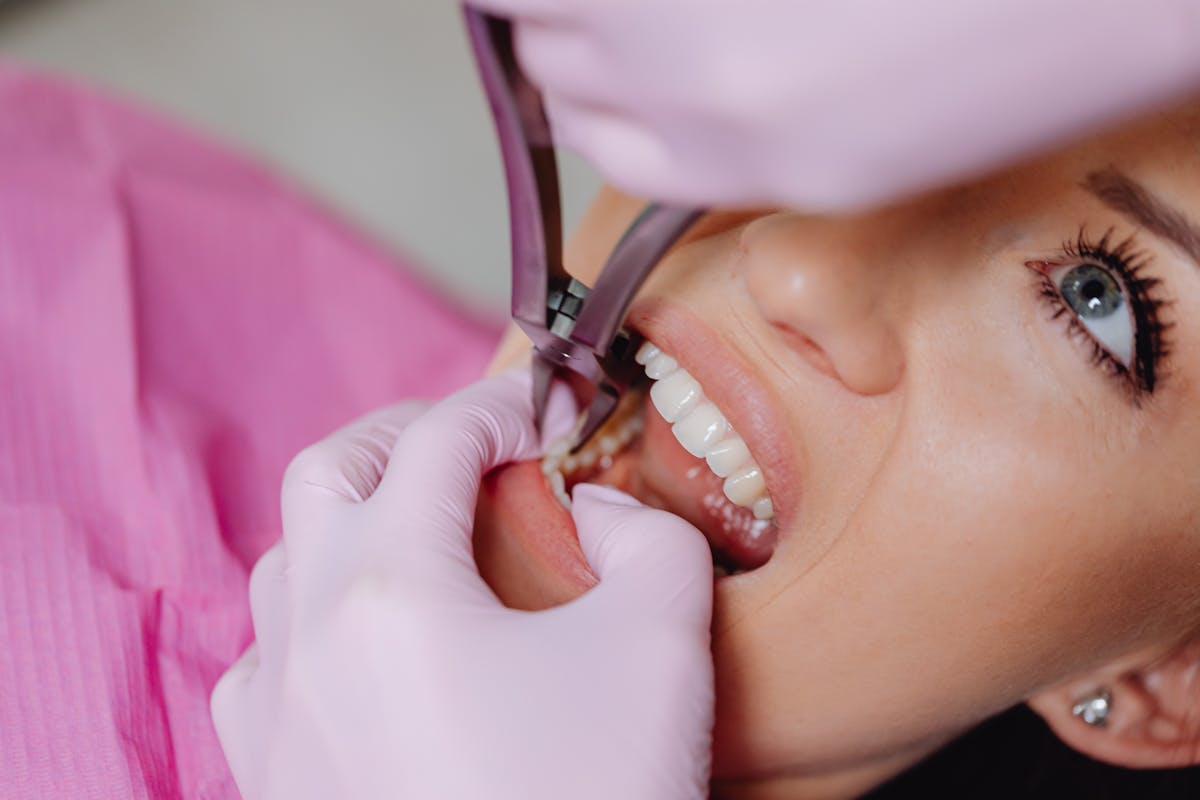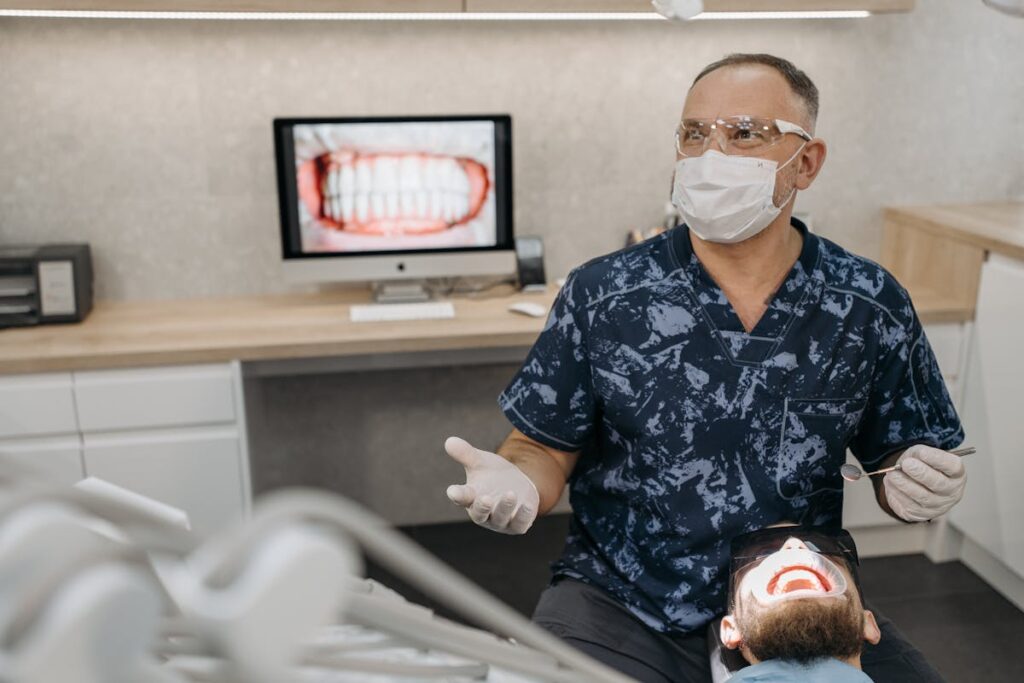For individuals experiencing persistent jaw pain, impacted teeth, or difficulty with chewing and swallowing, a visit to an oral surgeon in Normandy Park may be necessary. Other indicators such as oral infections, swelling, or facial trauma from accidents or sports injuries also warrant professional evaluation. Addressing these issues promptly is essential to prevent further complications. Recognizing these signs could be critical for maintaining ideal oral health. Discover the importance of timely intervention.
Persistent Jaw Pain or Discomfort
Persistent jaw pain or discomfort can be a significant indicator of underlying oral health issues that may necessitate a visit to an oral surgeon. When an individual experiences chronic headaches in conjunction with jaw stiffness, it often suggests a potential disorder of the temporomandibular joint (TMJ), which requires professional evaluation. The TMJ plays an essential role in facilitating jaw movement, and any dysfunction can lead to persistent pain. Such discomfort may also stem from bruxism, characterized by teeth grinding or clenching, which places excessive stress on the jaw muscles. If left unaddressed, these symptoms could escalate, affecting an individual’s quality of life. An oral surgeon in Normandy Park can conduct a thorough assessment to identify the underlying cause and recommend appropriate treatment interventions.
Impacted Teeth Causing Problems
While jaw pain is a compelling reason to seek professional evaluation, another significant oral health concern involves impacted teeth. These teeth, often molars, fail to erupt properly due to insufficient space or misalignment. Impacted molars can lead to various complications, such as discomfort, misalignment of adjacent teeth, and increased risk of decay. Furthermore, they may contribute to the formation of dental cysts. These cysts are fluid-filled sacs that can damage surrounding bone and teeth if untreated. Diagnosis typically involves a combination of clinical examination and radiographic imaging, which allows the oral surgeon to assess the extent of impaction and related issues. Addressing impacted teeth through surgical intervention is vital in preventing further oral health complications.
Oral Infections or Swelling
Oral infections, manifesting as swelling or discomfort in the mouth, can indicate a pressing need for a visit to an oral surgeon. These symptoms often point to underlying conditions such as an oral abscess or advanced gum disease. An oral abscess, characterized by a pocket of pus caused by bacterial infection, can lead to severe pain and swelling, potentially spreading to other areas if untreated. Similarly, gum disease, a progressive condition affecting the soft tissue and bones supporting teeth, can cause significant oral swelling. An oral surgeon in Normandy Park can provide necessary surgical interventions to drain abscesses, remove infected tissue, and halt the progression of gum disease, thereby preventing further complications and preserving overall oral health.
Difficulty Chewing or Swallowing

Experiencing difficulty in chewing or swallowing can be a significant indicator of underlying oral health issues requiring the attention of an oral surgeon. Chewing problems may arise due to malocclusion, temporomandibular joint (TMJ) disorders, or impacted teeth. These conditions can impede the proper breakdown of food, affecting digestion and overall health. Swallowing difficulties, medically termed dysphagia, may result from structural abnormalities within the oral cavity or throat. Conditions such as obstructive lesions, cysts, or even tumors can contribute to such complications. An oral surgeon can perform a thorough evaluation to diagnose the cause of these symptoms. By addressing the root cause through surgical intervention or other treatments, an oral surgeon can help restore normal function and alleviate discomfort associated with these issues.
Facial Trauma or Injury
Addressing issues related to chewing and swallowing can greatly impact overall oral health, but another critical area of concern is facial trauma or injury. Facial trauma can result from accidents, sports injuries, or violent incidents, considerably affecting both aesthetics and function. Common issues include facial fractures, which may involve the jaw, cheekbones, or eye sockets, and require immediate surgical intervention by an oral surgeon. Beyond bone injuries, damage to soft tissue, such as the gums, lips, or internal oral structures, can also necessitate professional evaluation and treatment. Prompt attention to these injuries is essential to prevent complications like infection or permanent disfigurement. Oral surgeons in Normandy Park are equipped to address these complex issues, ensuring ideal recovery and restoration of oral function.
Frequently Asked Questions
How Do I Prepare for an Oral Surgery Consultation?
Preparing for an oral surgery consultation involves gathering medical history, listing current medications, and noting symptoms. Consultation tips include asking questions about the procedure and recovery, ensuring understanding of surgery preparation steps, and discussing anesthesia options.
What Should I Bring to My Oral Surgeon Appointment?
For an oral surgeon appointment, the appointment checklist should include essential documents like dental records, insurance information, photo ID, and a list of current medications. Bringing these items guarantees a smooth and efficient consultation process.
How Long Is the Recovery Time After Oral Surgery?
Recovery time after oral surgery varies depending on the procedure, typically ranging from a few days to a few weeks. Effective pain management and diligent follow-up care are essential components for ensuring a smooth and timely healing process.
Are There Any Dietary Restrictions Before Oral Surgery?
Before oral surgery, patients are advised to follow specific dietary guidelines. Pre-surgery foods typically include soft, easily digestible options. Such guidelines are essential for minimizing complications and ensuring ideal surgical conditions and patient comfort during the procedure.
Is Oral Surgery Covered by Dental Insurance?
Insurance coverage for oral surgery varies based on the policy. While some procedures are considered medically necessary and covered, others may not be. Patients should verify with their insurance provider for specific details regarding coverage and costs.
